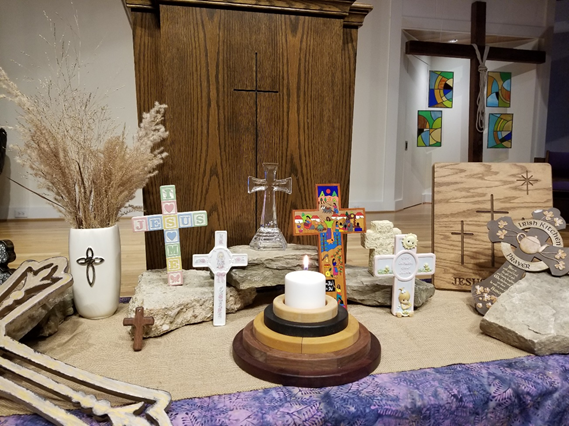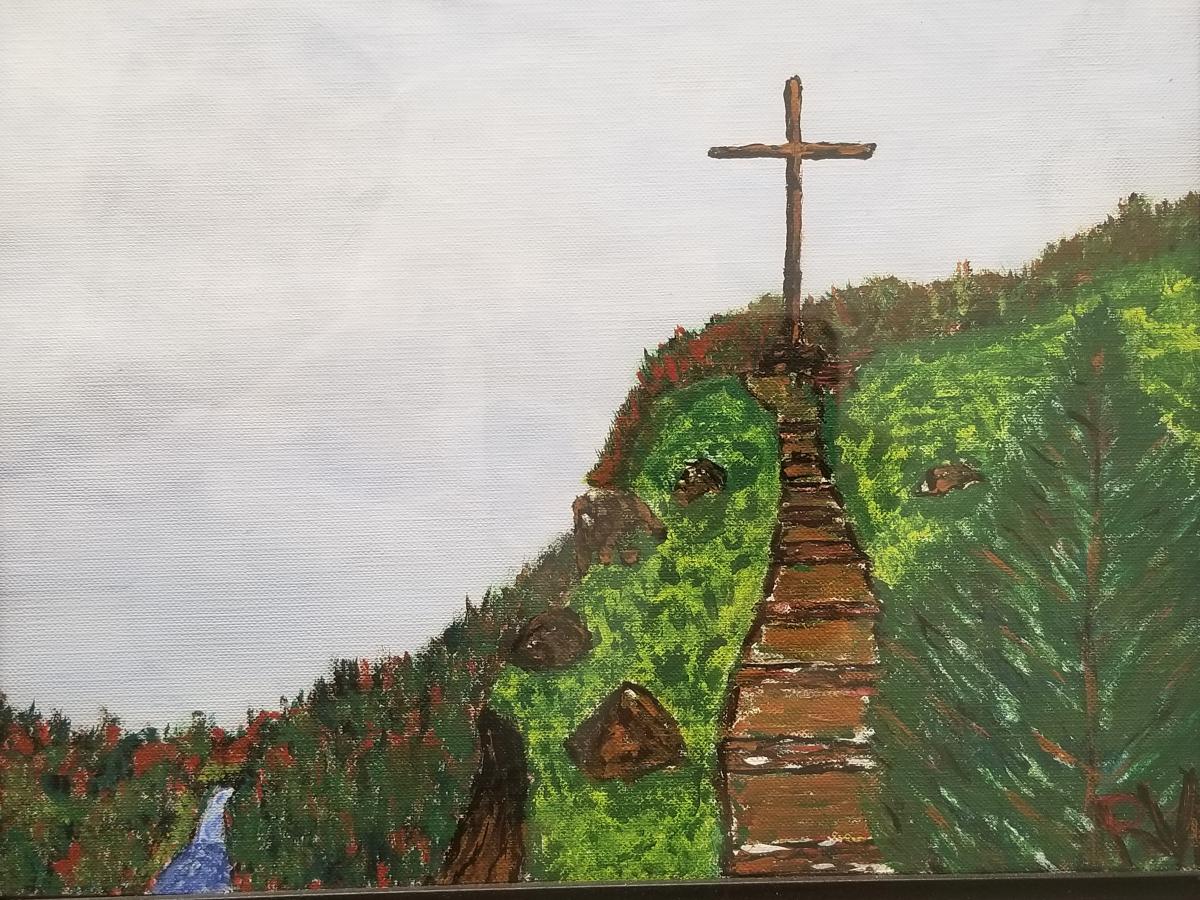CMC Sunday Meditations | 29 March 2020 | Lent 5
The Cross and the Death Penalty

Peace Candle Opening | Mark Rupp

As we meet today in spirit but not in person, we gather around these Sunday Meditations offered by members of the CMC community. Just as we light the Peace Candle to begin our worship, you are invited to light a candle for these Meditations. The flame joins us in spirit across distance, along with our sister church in Armenia, Colombia.
Scripture Reading | John 8:2-11 Common English Bible (CEB) | Oliver Davey
2 Early in the morning he returned to the temple. All the people gathered around him, and he sat down and taught them. 3 The legal experts and Pharisees brought a woman caught in adultery. Placing her in the center of the group, 4 they said to Jesus, “Teacher, this woman was caught in the act of committing adultery. 5 In the Law, Moses commanded us to stone women like this. What do you say?” 6 They said this to test him, because they wanted a reason to bring an accusation against him. Jesus bent down and wrote on the ground with his finger.
7 They continued to question him, so he stood up and replied, “Whoever hasn’t sinned should throw the first stone.” 8 Bending down again, he wrote on the ground. 9 Those who heard him went away, one by one, beginning with the elders. Finally, only Jesus and the woman were left in the middle of the crowd.
10 Jesus stood up and said to her, “Woman, where are they? Is there no one to condemn you?”
11 She said, “No one, sir.”
Jesus said, “Neither do I condemn you. Go, and from now on, don’t sin anymore.”
Opening Thoughts: A Better Question | Joel Miller

We begin our Sunday Meditations with this story from John 8. It’s a simple story involving a difficult question. Jesus is in the temple, teaching, and the religious authorities, already trying to undermine Jesus’ authority, bring before him a woman caught in adultery. They present a question that would have had legal, religious, and ethical implications. The law of Moses commands that such a woman be stoned. What do you say, Jesus? If it were up to you, Jesus, what would you say? About this woman. Caught in adultery. What should we do?
It’s a difficult spot to be in. Go against Moses, and he’s a heretic. Go with the death penalty, and it undermines his message of compassion.
Perhaps Jesus needed a bit of time to think about it. Rather than answer, he bends down, and, silently, starts writing in the dirt. Thus giving theologians endless opportunity to suggest what he might have been writing, and to point out that this proves Jesus could indeed write – not a common skill at the time.
This is all quite interesting, but it isn’t the point of the story.
As he is bent down, writing in the dirt, they keep questioning him. Which one is it Jesus? Do we stone her or not? Which one?
Jesus, somewhere down there in the dirt from which all humanity was first formed, finds his response. He straightens up and says this: “Let anyone among you who is without sin cast the first stone.”
He doesn’t answer their question: Is she or isn’t she deserving of death? His answer suggests that not only does he disagree with the answer they would likely give. He disagrees with the question entirely. Jesus disagrees with their entire way of framing the situation.
It necessarily takes two to commit adultery, and they have selected the one with the least power to be held fully responsible. Or maybe she was innocent altogether, falsely accused in order for the authorities to make a point. Her guilt or innocence is not the point of the story either.
What Jesus does is point the question back at those who have conjured this whole scenario. Jesus seems to accept that a righteous cause is a legitimate human project. He just directs their righteous energy back at themselves. Jesus suggests that the point of the story is that they, we, everyone listening, might consider what it is within us that causes us to unload our anger and disdain onto others, especially the most vulnerable, the easy targets, rather than examine what it is within us from which that anger and disdain arise. Where does it come from? And why do we do this? Why do we keep doing this?
Today’s service focuses on the Cross and the Death Penalty– a heavy topic during a heavy time. One loaded with political, legal, religious, and ethical implications. As we do this in the context of worship, you are invited to read or listen introspectively. Not only for the external injustices swirling around the death penalty, but for the inner movements within you. For times you have been wounded, or have wounded others. For healing for ourselves and others. For new ways of thinking about ourselves and our neighbors. For ways not just to agree or disagree with answers people propose, but to find an entirely different basis from which to ask better questions. If nothing else, may these meditations leave you with a better question than when you started.
Call to Worship | Josh and Bethany Davey


Those named are scheduled for execution this calendar year in Ohio. We speak their names as an act of solidarity: we hope to honor their humanity, their lives and those who love them and whom they love.
God, we gather in the light of your love and mercy.
Romell Broom
God, we gather in the fullness of our humanity.
James Galen Hanna
God, we gather in the awareness of our vulnerability.
Douglas Coley
God, we gather to hear those whose voices are silenced and stories are unheard.
Kareem M. Jackson
God, we gather to confront the systems that take life, and our own complicity in those systems.
Stanley L. Fitzpatrick
God, we gather to collectively cleanse ourselves.
David Sneed
God, we gather in the name of life and freedom for all.
Amen.
*Those scheduled for executions in Ohio between 2020-2024 are listed on this site: https://drc.ohio.gov/execution-schedule. Please consider calling Ohio Governor Mike DeWine (614.644.4357) and advocating for the lives of these people by name. We recognize that the acts of these individuals have caused broken lives and misery for people who will end up living with it for the remainder of their lives. However, we believe we do not eliminate evil or end violent behavior by executing a person who has violently murdered another.
Song | Who’s Got the Right to Life? | Written and sung by Phil Hart

Children’s Time | Allen Bohnert
Children’s Time 3.29.20 from Gwen Reiser on Vimeo.
Prayers of the People | sent by email
Pastoral Prayer | Mark Rupp
God who is near to us as breath, we come before you today as people who need to breathe deeply. We long to be together, yet we know that our physical separation is a choice to love those most vulnerable. May our desire to care for the vulnerable always be stronger than our desire to maintain the status quo, and may we remember that no physical separation can sever the bonds of the Spirit. Grant us courage and creativity as we face these new realities and forge new paths to show the world that love can never be canceled.
We especially lift up to you those specific requests that have been named among our community. Hear us as we remember those names and the names of those on our own hearts…
[silence]
In all our places of pain,
may we feel your comfort.
In all our places of confusion,
may we know your reassurance.
In all the places where we can no longer be strong,
may we experience your grace.
In all our moments of isolation,
may we be surrounded by communities of peace.
Amen.
Song |
Meditation | We wash our hands | Josh Davey

So when Pilate saw that he could do nothing, but rather that a riot was beginning, he took some water and washed his hands before the crowd, saying, “I am innocent of this man’s blood; see to it yourselves.” —Matthew 27:24
One of the most striking moments to me in the story of Jesus’ execution is when Rome’s representative of Judea, Pontius Pilate, presides over the the trial and sentencing of Jesus. Jesus is brought before the Roman governor of Judea, stands trial in Roman court, and is executed on a Roman cross.
Here is an empire, perhaps one of the most powerful in terms of military and influence that the western world has ever seen, whose appointed regional leader is afraid to go against the apparent wishes of the rabble who are demanding crucifixion. Pilate, apparently believing he was an innocent man, has the authority to let Jesus walk free. What are we to make, then, when Pilate washes his hands?
Pilate indeed does feel stuck. An angry crowd demands something that he can’t sign off on. If he assents the angry crowd’s request, he’ll have an innocent man’s blood on his hands. If he denies the angry crowd, a riot seems almost certain. He can’t feel good about either, so he bows out.
Yet perhaps, in a more nuanced reading of this passage, we see that he washes his hands as a way to absolve himself of guilt of allowing the state-sponsored violence against an innocent man. What if Pilate, as he has the power to let Jesus go free or “allow” his execution, is the very linchpin of Jesus’ execution? His role in the matter is as important as anyone else’s.
He washes his hands.
Today, as in ancient Rome, we live in an era of extensive state-sponsored violence. There are the obvious examples, like executions carried out by the state, or by police officers in the streets. But the state-sponsored violence does not stop there. Indeed, many actions of the state are actively violent towards the most vulnerable in our society, through mass incarceration, mass surveilence, and disparities in income, education, housing, and medical access.
My fear is that this current epidemic will be yet another avenue for the state to enact violence on the most vulnerable of our society. I believe we’re already seeing some of it in real time. White-collar workers are asked to work from home, but truck drivers, warehouse employees, janitorial staff at hospitals, and so many others have either been fired or asked to work more strenuous hours. And the constant blmaing and scapegoating of Asian Americans is getting more intense by the day. With so much of the federal government effectively shut down out of necessity, it is rather telling the ICE continues to perfoms raids and show up at courthouses to take people into custody.
With the shortage of coronavirus test kits, it seems like the rich and powerful have a place at the front of the line to get tested, while others are told to wait until symptomatic. And so many people sit in prisons and jails, unable to practice any kind of social distancing, awaiting the inevitable outbreak of infection. For so many incarcerated, this will be a death sentence.
By now, most if not all of us are hunkering down in our homes, practicing social distancing, and increasing the amount of times we wash our hands.
We wash our hands.
And wash our hands we should! Although much is still unknown about this novel coronavirus, many medical professionals and epidemiologists agree that the best way to slow the spread of the virus is to practice social distancing, staying at home as much as possible, wash our hands regularly and thoroughly, and avoid contact with those outside our home as much as possible.
Still, the moment of Jesus’ execution on a cross provides us a mirror to look at ourselves, particularly in this unique and terrifying time. Even if we don’t actively enact violence through state-sponsored means, are we completely disinterested? What of those who are unable to follow the social distancing and hygienic guidelines? Have we washed our hands to absolve ourselves of the violence happening to those more vulnerable that us? Are there ways in which we have passively accepted the violence happening to the vulnerable in our community and country?
And when the cloud of pandemic has lifted, when we see the death toll of the virus and economic ruin it left in its wake, what will our response be? Will we be willing to look for the many ways, directly and indirectly, that violence has been done to the vulnerable? Will we be willing to advocate for their dignity and humanity? Or will we, like Pilate, wash our hands of the matter, saying “I am innocent… see to it yourselves?”

This painting is by Robert Van Hook, a death row inmate represented by Allen Bohnert who speaks more of him during the interview below. Robert was executed by the state of Ohio in 2018.
Interview | The Cross and the Death Penalty | Joel Miller, Hannah Kubbins, Allen Bohnert | audio: 26m10s
Closing Song |
Special thanks to Galen Martin and Elisa Leahy for audio and video assistance.
